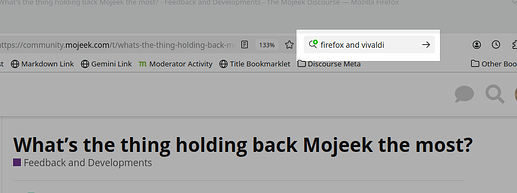Mojeek is committed to neutrality and privacy.
In broad terms, this means that a controversial subject won’t be censored, users won’t be tracked, and clicks won’t influence search results.
two people searching with the same search settings (typically country and language) at the same time will get the same search results
Mojeek is primarily based on lexical search. There, the search algorithm looks for your keywords in the page title or body or in incoming links. Web pages that more closely match your keywords are ranked higher in the search results. And, the algorithm makes no attempt to interpret your intent or to respond to trending topics.
These commitments promote the health of the Internet. Mojeek users have a common view of the Internet. We don’t experience censorship. Mojeek organically links to other websites. And, Mojeek is incentivized to make a better search engine rather than better adtech.
That said, using Mojeek on a daily basis is not what I expect.
I am accustomed to typing keywords and either ending up where I intended or having a collection of high quality links: something I might collect if I spent hours researching a topic. This is often not what happens.
Often, lexical search places a result farther down than I expect.
Or, I have to pick through the results specifically because there is no click data or bias boosting the results that I might find useful.
So, there is a trade-off.
There are two things that help me.
First, I use a dedicated search box in Firefox and Vivaldi. And I have it set to preserve my keywords. This way I can start with Mojeek and then reuse the same keywords in other search engines without having to retype anything. You can do something similar within Mojeek by using their Search Choices feature. That turns on buttons which will resend your keywords to a search engine of your choice.
Second, the obvious alternative to lexical search is semantic search. That’s where the search algorithm has the ability to interpret your keywords. However, I don’t think that is necessary for Mojeek. For a while, I’ve been writing about Searching by Intent. And, in my view, today’s blog post is a version of that: giving Mojeek users the ability to search within a set of results. But, to simplify, I’d rather do something like a SQL INTERSECT between two sets of Mojeek search results. And, that is not directly possible for ordinary users today.
I use Mojeek every day. And, I’m willing to work around its limitations. I think Mojeek is better for the Internet and civil society. And, I’m trying to give it every chance for success.
As Josh wrote in your other thread, the best things you can do to help Mojeek are to use it, give feedback, and share it with like-minded people.
